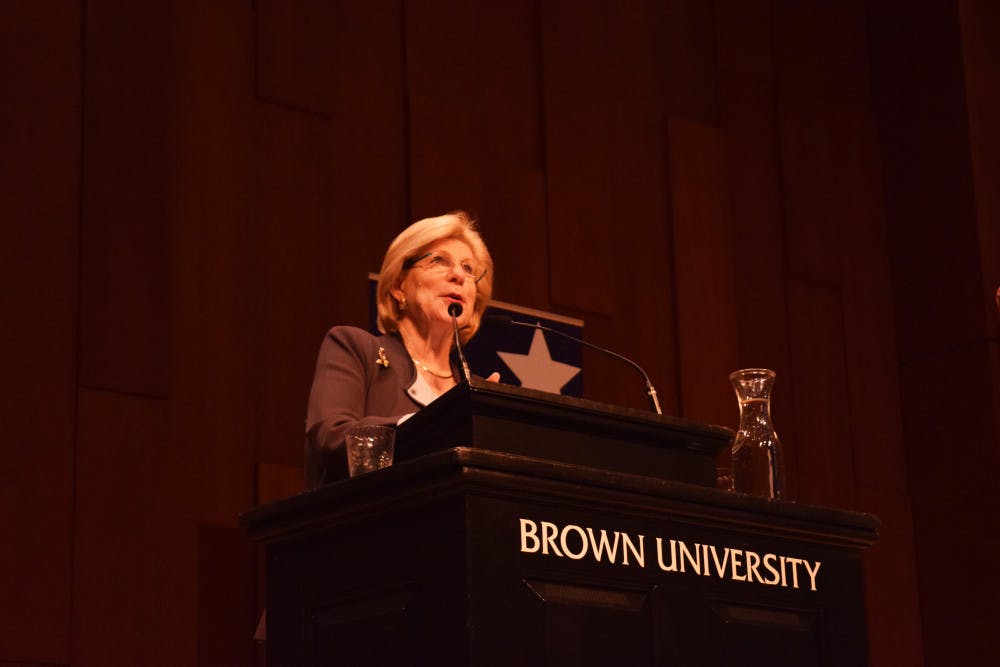With almost half a century of reporting experience under her belt, award-winning legal affairs correspondent for National Public Radio Nina Totenberg noted with amusement to a packed Salomon 101, “I have been covering the Supreme Court longer than any of the current justices have been serving.”
Totenberg “is famous for her direct, no-nonsense, crystal clear reporting on law and legal issues, and she’s won just about every major journalism award in broadcasting,” said Jim Morone, director of the Taubman Center for American Politics and Policy, who introduced Totenberg. He added that he relies on Totenberg’s reporting in his own classroom.
Totenberg began her speech with a myriad of short — yet highly entertaining — stories about the Supreme Court justices over the years. Clearly an insider, she mentioned everything from one of Justice Elena Kagan’s surprising new hobbies (hunting) to Justice Ruth Bader Ginsburg’s beverage of choice before this year’s State of the Union address (wine).
Since 1968, when she first began covering the Court, Totenberg has observed its “changing demographics” in terms of the Court’s race and gender makeup. Furthermore, the Court’s handling of certain issues was much different then than now, she said, citing cases related to free speech, the First Amendment and issues of race, gender and sexuality.
“The Court struck down laws banning interracial marriage the year before I started reporting,” she said. Nevertheless, she noted that there remain severe voter-restriction laws in Alabama that will effectively prevent many people living in communities of color from voting.
Totenberg also explained how certain types of cases have “totally disappeared” from the courts, such as “obscenity cases.” Eliciting a laugh — as she did throughout the evening — she described the process by which certain “allegedly dirty” videos were viewed by the justices in the 1970s. At the time, the videos were screened in a special viewing room in the basement of the Court, and Justice Potter Stewart had to narrate the videos for Justice John Marshall Harlan II, “who was almost blind,” Totenberg said.
Cases related to technology were practically non-existent in the late 1960s. “Now there are so many,” she said.
Looking to the future, Totenberg predicted that there will be a challenge to the “one person, one vote law” determining whether states use the total population or the number of eligible voters to determine representation. She also said that there will be “a challenge to affirmative action” in the coming judicial term.
One major transformation that the Supreme Court has undergone over the past few decades is an increase in predictability, she said. “There wasn’t much predictability when I started covering the court,” she added. The justices are also “more divided into liberal and conservative camps,” reflecting an ideologically polarized era, she said.
At the end of the lecture, students and guests immediately rushed to the microphones, brimming with questions for Totenberg. Questions ranged from specific inquiries about certain justices, such as Justices Clarence Thomas and Ginsburg, to career advice for aspiring journalists. To these journalists, Totenberg replied, “You have to deal with the possibility that it may not work out.”
In response to a question about the justices’ ability to adjudicate on matters in which they are not experts, such as cybersecurity, Totenberg said, “The justices are generalists, and they need to hear from specialists in various areas who may disagree with one another.”
“It’s the same reason I have a 22-year-old intern,” she said. “Who do you think taught me how to Tweet?”
Students also asked about the role of technology in the Supreme Court and the possibility that cases could be made available to the public on video. One reason there is resistance to this development is to maintain the relative anonymity of the justices in public, Totenberg said. “They’re still regular folks, in addition to being stupendously smart ones.”
One audience member asked, “How do I get on the Supreme Court?”
Totenberg replied, “Ask for God’s help.”





